Hamas’ Oct. 7 operation laid waste to Israel’s belief that Palestinians can be siphoned off into Bantustans while the colonizing state enjoys peace and expansion, writes Tareq Baconi.
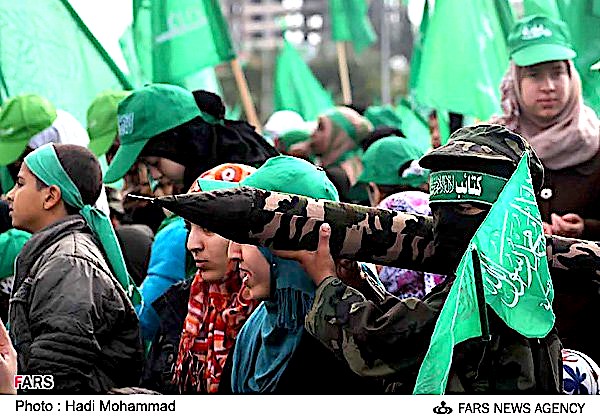
25th anniversary of Hamas celebrated in Gaza on Dec. 8, 2012. (Fars Media Corporation, Wikimedia Commons, CC BY 4.0)
By Tareq Baconi
Al-Shabaka
 Hamas’ surprise offensive last Oct. 7 dealt the most lethal blow to the Israeli military and public since the establishment of the state in 1948.
Hamas’ surprise offensive last Oct. 7 dealt the most lethal blow to the Israeli military and public since the establishment of the state in 1948.
In retaliation, Israel launched the most extensive military assault on Gaza in its history, destroying large swathes of the territory and killing more than 22,185 Palestinians and injuring at least 57,000 as of Jan. 2, according to the Gaza Health Ministry.
With green lights from the U.S. and much of Europe, Israel has carried out what scholars and experts have called a genocide campaign, seeking to rid itself of the Palestinians in Gaza under the guise of decimating Hamas.
The speed with which Israel mobilized and the scale of its assault underscore the Palestinian conviction that the settler colonial regime is executing long-held plans for mass expulsion. Meanwhile, Israeli officials have utilized a narrative campaign of Palestinian dehumanization to lay the groundwork for justification of the immense violence.
Israel claims to be both a Jewish and democratic state while refusing to declare its official borders and controlling a sovereign territory that has more Palestinians than Jews living within its boundaries.
To achieve this reality requires a sophisticated structure of demographic engineering — one premised on the legal stratification of Palestinians as well as the strict control of their movement and places of residence, confining them to geographic enclaves.
This system was born out of the initial wave of mass expulsion and ethnic cleansing of Palestinians that took place in 1948, in which more than 530 Palestinian villages were depopulated to make room for Jewish settlers.
This settler-colonial practice is not an event that has passed into history books. What Palestinians call the Nakba has been ongoing ever since, with Israel’s daily colonization practices taking different forms in different areas under its control. It is what constitutes a central pillar of Israel’s apartheid regime.
Gaza: Israel’s Starkest Bantustan
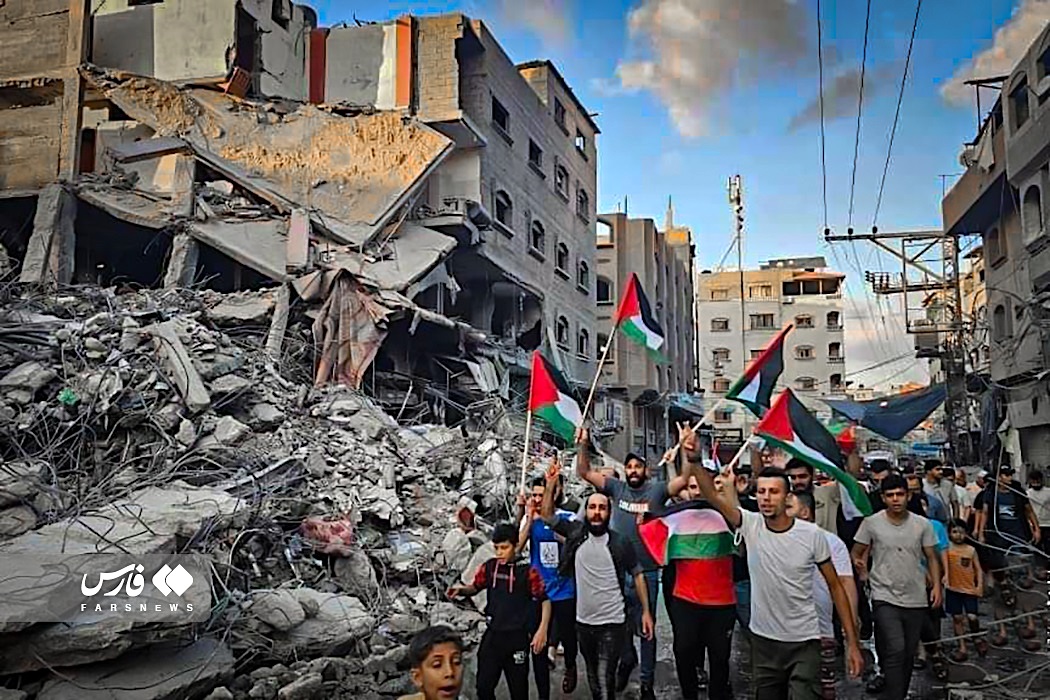
Gaza, Oct. 17, 2023. (Fars Media Corporation/Creative Commons Attribution 4.0 International License.)
Gaza has historically presented the most extreme manifestation of what Israel’s Bantustan system for Palestinians looks like. With one of the highest population densities in the world, Gaza is composed predominantly of refugees expelled from the lands surrounding the strip during Israel’s establishment in 1948.
Indeed, many of the fighters who broke into Israeli towns on Oct. 7 are likely descendants of refugees from the very lands they glided over or crawled into, stepping onto these grounds for the first time since their families’ expulsion.
Since 1948, Israel has expended every effort to sever the link between present-day anti-colonial resistance and Israel’s historic and present system of apartheid.
While many assume that Gaza is under blockade because it is governed by Hamas, Israel in fact has experimented since 1948 with endless tactics to depoliticize the territory or pacify its population. These tactics included economic strangulation and blockades, decades before Hamas was even established, to no avail.
With Hamas’ takeover in 2007, Israeli leaders were presented with an opportunity: Using the rhetoric of terrorism, Israel placed Gaza under a hermetic blockade and ignored the movement’s political platform on which it had been democratically elected.
The blockade was initially intended to be a punitive tactic to force Hamas’ capitulation, but it quickly morphed into a structure aimed at containing Hamas and severing the coastal enclave from the rest of Palestine.
With over 2 million Palestinians out of sight behind walls and under siege and blockade, the Israeli government and most of the Israeli public — let alone Western leaders — could wash their hands clean of the reality they had created.
Israel’s blockade serves the regime’s aim of containment, both of Palestinians and of Hamas. Over the course of the past 16 years, Israel has relied primarily on Hamas to govern Gaza’s population while retaining external control of the enclave.
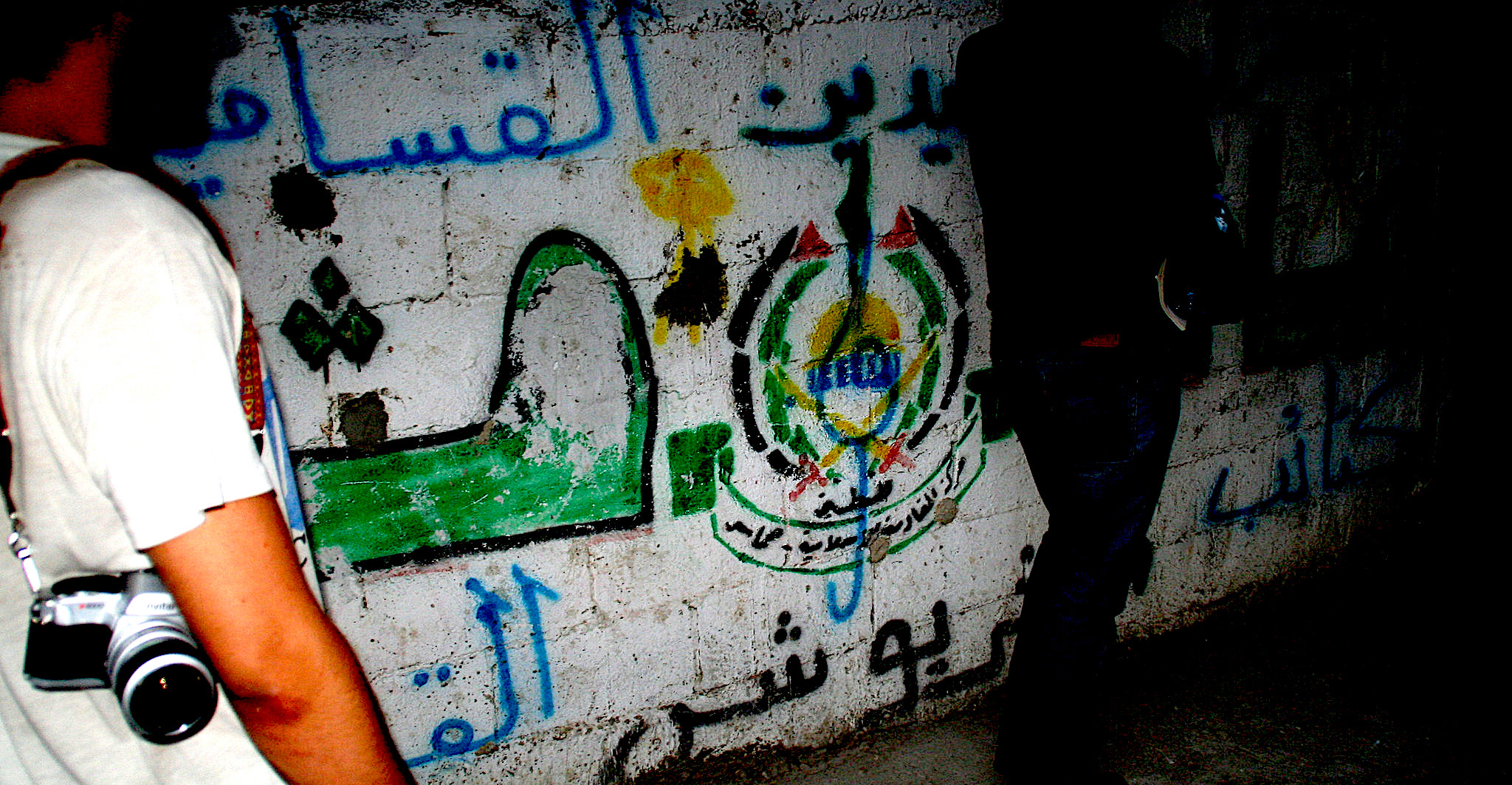
Hamas symbol on a wall in the Palestinian city of Tulkarem in the occupied West Bank, 2008. (Michael loadenthal, Flickr, CC BY-NC-SA 2.0)
Hamas and the Israeli regime fell into a volatile equilibrium, often erupting into episodes of immense violence in which thousands of Palestinian civilians were killed by the Israeli military. For Israel, this dynamic worked so well that a political strategy for Gaza was never required.
Like elsewhere across Palestine, Israel relied on managing the occupation rather than addressing its political drivers, maintaining itself as occupying overlord over the various Palestinian pockets governed by entities under its sovereign control.
The only goal that Israel pursued in the past decade and a half was to try to ensure relative calm for Israelis, particularly those residing in the areas surrounding Gaza. It did so by using overwhelming military force, even if such calm came at the expense of imprisoning a captive population of millions and maintaining them in near starvation-like conditions.
So thoroughly was Gaza erased from the Israeli psyche that protesters marching to protect so-called Israeli democracy in early 2023 effectively deluded themselves into believing that democracy and apartheid were sustainable bedfellows.
Collapse of Partitionist Framework
Thus, Hamas’ offensive came as if out of nowhere for most of the Israeli public and supporters of Israel abroad. By breaking out of its prison, the Al-Qassam Brigades — Hamas’ military wing — revealed the strategic poverty at the heart of the assumption that Palestinians would acquiesce indefinitely to their imprisonment and subjugation.
More importantly, the operation laid waste to the very viability of Israel’s partitionist approach: the belief that Palestinians can be siphoned off into Bantustans while the colonizing state continues to enjoy peace and security —and even expands its diplomatic and economic relations in the wider region.
By shattering the notion that Gaza can be erased from the broader political equation, Hamas has left in tatters the illusion that ethnic partition in Palestine is either a sustainable or effective form of demographic engineering, let alone a moral or legal one.
Within hours of the Al-Aqsa Flood operation, the infrastructure that had been put in place to contain Hamas — and with it, to wish away the Palestinians of Gaza — was trampled before our collective and often disbelieving eyes.
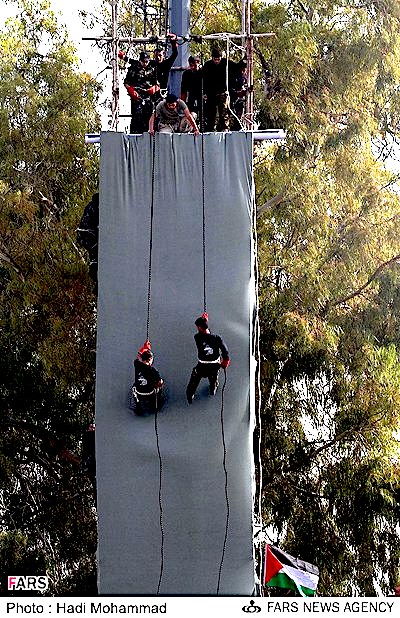
Al Qassam militants rappelling during a training exercise in Gaza in January 2013. (Fars Media Corporation, Wikimedia commons, CC BY 4.0)
As Hamas fighters burst into Israeli-controlled land, the collision between the myth of Israel as a democratic state and its reality as a purveyor of violent apartheid was shocking, tragic, and ultimately irreversible.
As a result, Israelis and Palestinians were thrown into a post-partition paradigm, where both Israel’s conviction in the sustainability of demographic engineering and the Bantustan infrastructure it has employed have been revealed to be temporary and ineffective.
The collapse of the partitionist framework has presented a paradox.
On the one hand, Palestinians and their allies have worked to mainstream the understanding that Israel is a settler colonial apartheid state. This grounding has served as the basis for efforts by some to push for decolonization and the pursuit of a polity rooted in freedom, justice, equality, and self-determination.
The political architecture of such a decolonized space is one that many Palestinians believe will be produced through their struggle for liberation, once the central tenants of apartheid — ethnic cleansing, the refusal to allow refugees to return, and partition — are dismantled.
On the other hand, in the absence of a political project that can champion this de-colonial struggle, the collapse of the partition framework on Oct. 7 accelerated Israel’s commitment to ethnic cleansing.
It likewise reinforced the fascist and ethno-tribal belief that, in the absence of partition, only Jews can safely exist in the land of colonized Palestine, from the Jordan River to the Mediterranean Sea. In other words, the collapse of partitionist possibilities may have laid the groundwork for another Nakba rather than a decolonial future.
Hamas’ Political Calculus
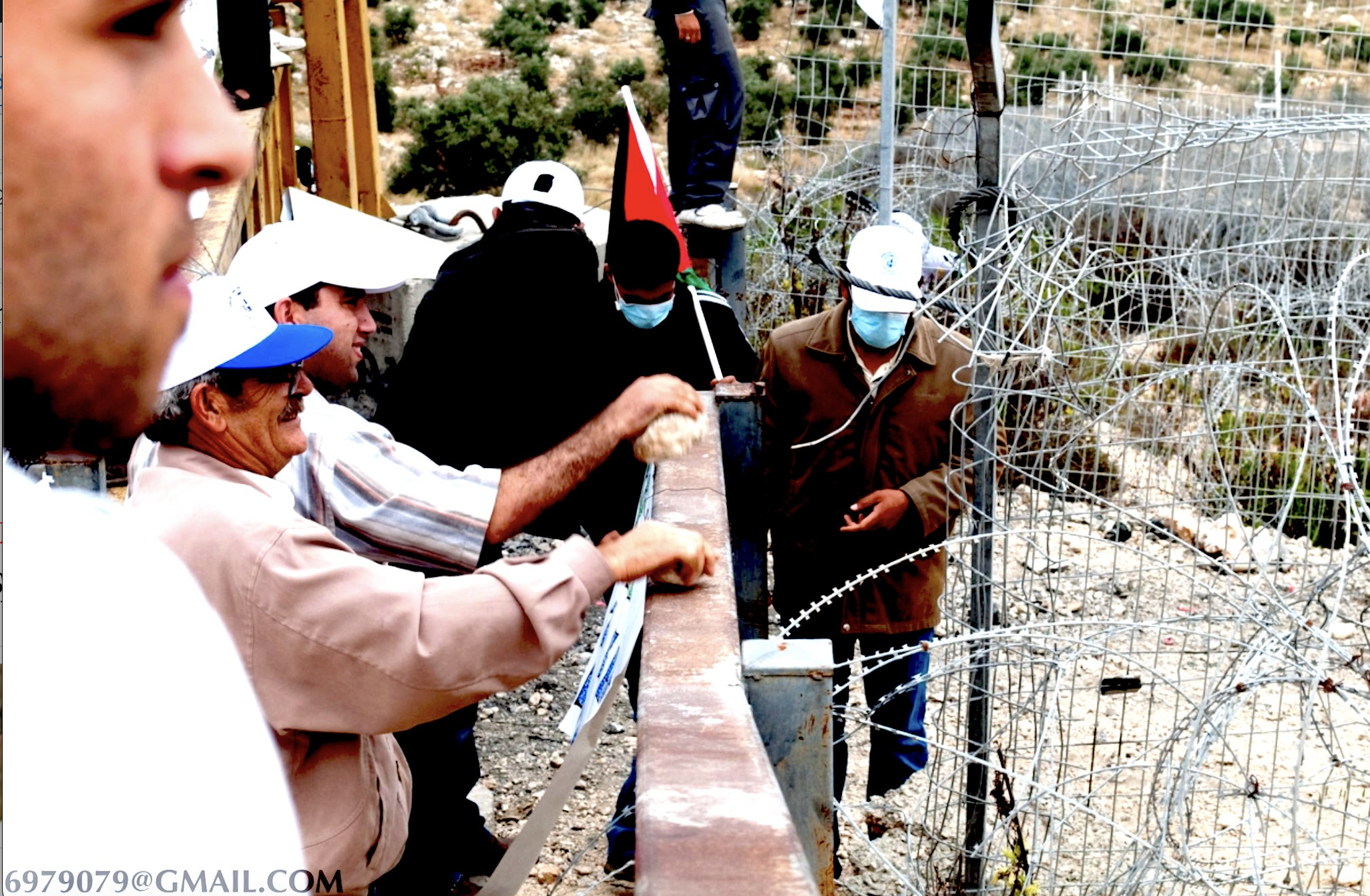
Palestinians hammer on the separation fence in protest in Bilin in the occupied West Bank in April 2010. (Edo Medicks, Flickr, CC BY-NC-SA 2.0)
This paradox explains, in part, why there has been resentment voiced at Hamas’ offensive, including from some Palestinians, who see in the attack the beginning of another crisis for their collective struggle.
The looming possibility of ethnic cleansing must not be underplayed, and the staggering death toll that civilians in Gaza are experiencing must give everyone pause to reflect on the enormous cost that Hamas’ operation initiated, even when primary responsibility for this violence sits squarely with Israel’s colonial regime.
Please DONATE to CN’S Winter Fund Drive
However, such a reading misrepresents Hamas’ political calculus. Of course, there is truth in suggesting that this violence was unleashed following Hamas’s attack. Yet the reality before the offensive was also lethal for Palestinians, even if to a lesser extent than what ensued after Oct. 7.
It was a violence that had become normalized and that, at its core, had the same aim to ultimately kill Palestinians en masse.
The violence we’ve witnessed since Oct. 7 is nothing more than the unleashing of a brutality that had always set the foundation for Israel’s engagement with Palestinians generally, and with those in Gaza specifically.
This rupture was thus inevitable. Hamas’ containment was effective, yet given the movement’s commitment to Palestinian liberation, and its firm refusal to concede by recognizing the State of Israel, that containment was always likely to be temporary unless serious effort was expended to deal with the political drivers at the core of the Palestinian struggle for liberation.
With a growing population in Gaza and governance shortfalls that were becoming increasingly acute, the expectation that Hamas would not overturn that reality — especially as Israeli impunity expanded — was short-sighted.
What Hamas does bear responsibility for, and what Palestinians must hold them accountable for, is the extent of its planning — or lack thereof — for the day after the attack.
[Related: SCOTT RITTER: Israel’s Massive Intelligence Failure]
With the knowledge that Hamas and others have gathered over the years, there would be no question that the movement’s offensive would result in unleashed fury on Palestinians at the hands of the Israeli military. The movement should have been — and perhaps was — prepared for the violence that has subsequently unfolded in Gaza.
Determining whether its calculus paid off, despite this tragic loss of life, is something Palestinians will grapple with for years to come.
Western Hypocrisy & Culpability
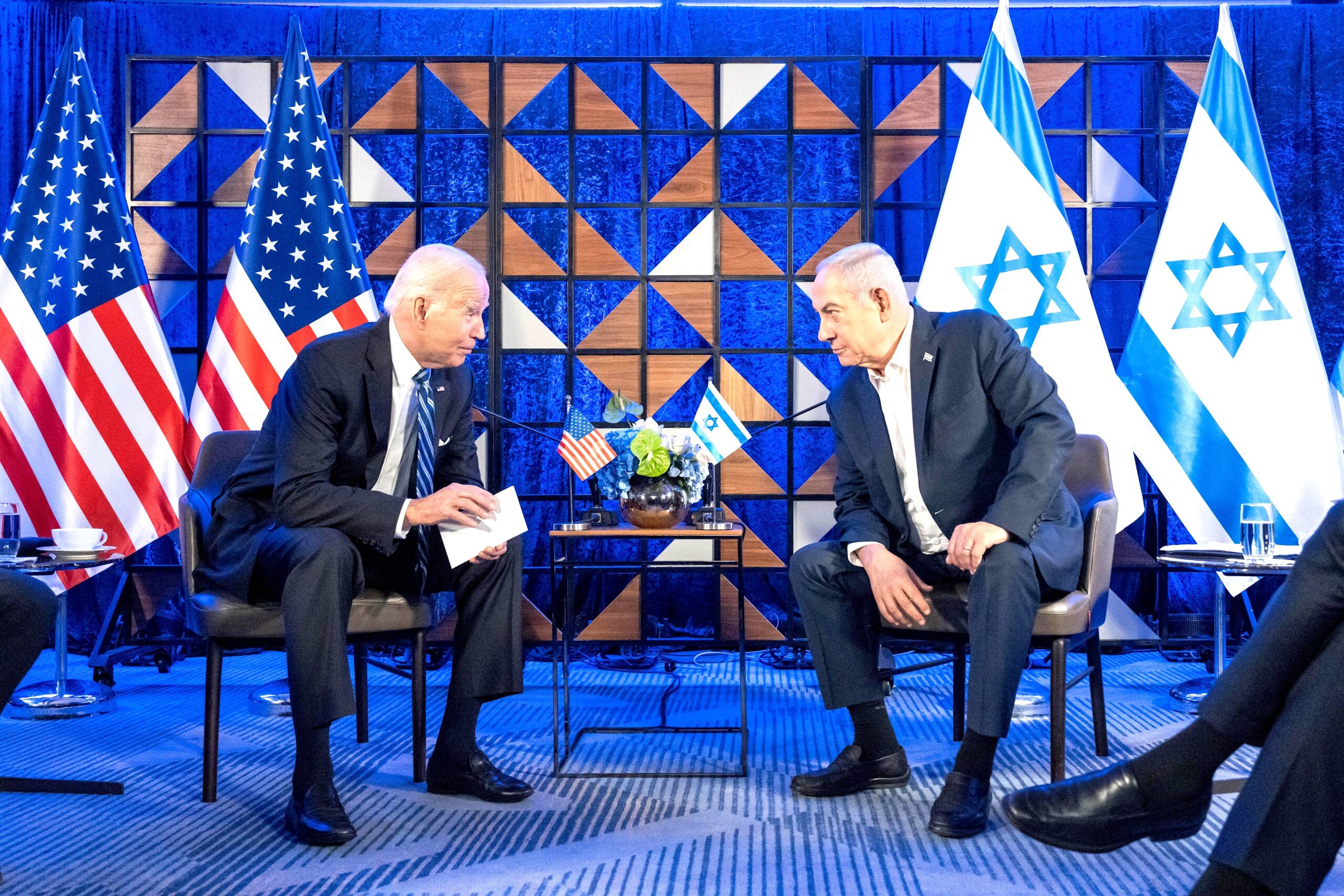
U.S. President Joe Biden with Israeli Prime Minister Benjamin Netanyahu in Tel Aviv on Oct. 18, 2023. (The White House, Public domain)
Rather than attempt to de-escalate Israel’s assault on Gaza, the Biden administration has only poured fuel on the fire. In his first speech after the attack, the U.S. president described Hamas as “pure evil,” comparing its offensive to those of ISIS; he also likened Oct. 7 to 9/11 and repeatedly referred to widely discredited claims of brutality to stir up orientalist and Islamophobic tropes in an effort to justify the ferocity of Israel’s response.
It is important to note that efforts to link Palestinian resistance in all its forms — peaceful or armed — to terrorism long pre-date Hamas’ attack.
During the Second Intifada, Israeli Prime Minister Ariel Sharon’s invocation of 9/11 found a receptive audience in the Bush administration, which was in the early stages of crafting its War on Terror doctrine. The ensuing months saw Israel unleash hugely destructive military invasions against refugee camps in the West Bank under the rubric of fighting terrorism.
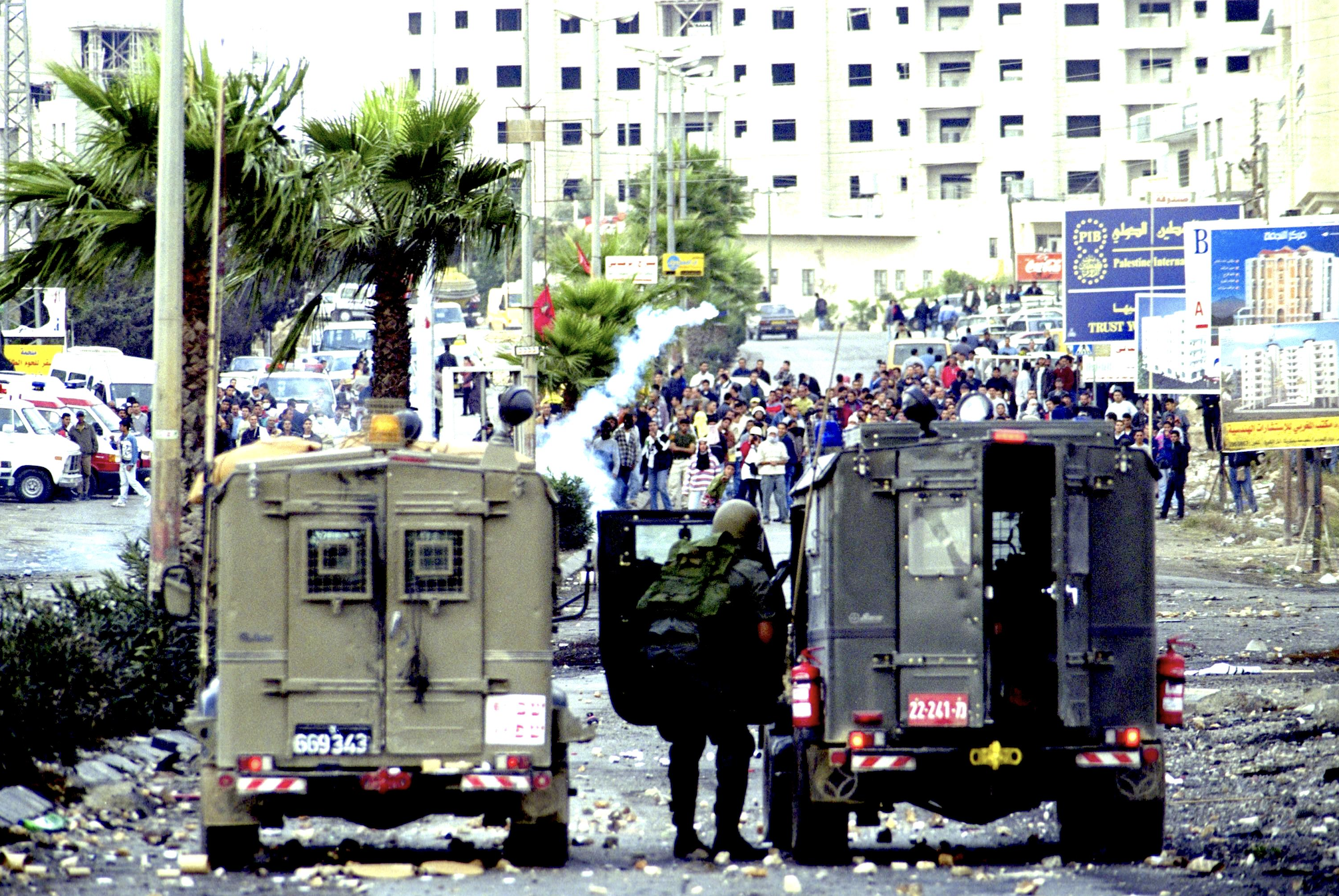
Palestinians confronting Israeli forces on Oct. 20, 2000, at “Ayosh” Junction, near Ramallah in the occupied West Bank. (Nadav Ganot, IDF Spokesperson’s Unit, Wikimedia Commons, CC BY-SA 3.0)
Meanwhile, mainstream Western media and policy pundits continue to lack nuanced and grounded analysis on the unfolding situation.
Instead, a consistent pattern of Palestinian dehumanization has been so thoroughly meted out that any effort to utilize these platforms to dismantle — or merely call into question — Israel’s system of domination is met with perplexed reactions and uniform condemnation.
In this reading, Hamas acted irrationally, Palestinians in Gaza were disposable to the movement as human shields and Israel’s colonial system as a whole was sustainable and calm prior to Oct. 7. These reactions, more than anything, point to Western hypocrisy and anti-Palestinian racism.
What is clear is that Western leaders are willfully refusing to acknowledge Hamas’ attack for what it was: an unprecedented display of anti-colonial violence.
The Al-Aqsa Flood operation was an inevitable response to Israel’s relentless and interminable provocation through land theft, military occupation, blockage and siege, and the denial of the fundamental right to return to one’s homeland for more than 75 years.
Rather than reaffirming ahistorical analogies and regurgitating tired narratives, it is past time for the international community to contend with the actual root cause of the violence we are witnessing: Israeli settler colonization and apartheid.
To limit the blood that will be spilled as Israel’s system of apartheid is challenged, the international community, particularly the West, must first reckon with the fact that it has enabled an ethnonationalist political system that has eviscerated Palestinian rights and lives.
The world must face the reality that Palestinian political demands cannot be erased or sidelined under the all-encompassing but unconvincing banner of fighting terrorism. Rather than learning these lessons, Western policymakers appear content to serve as active partners in the Israeli regime’s current ethnic cleansing campaign — the nakba of my generation.
Tareq Baconi serves as the president of the board of Al-Shabaka. He was Al-Shabaka’s U.S. policy fellow from 2016 – 2017. Tareq is the former senior analyst for Israel/Palestine and Economics of Conflict at the International Crisis Group, based in Ramallah, and the author of Hamas Contained: The Rise and Pacification of Palestinian Resistance (Stanford University Press, 2018). Tareq’s writing has appeared in The London Review of Books, The New York Review of Books, The Washington Post, among others, and he is a frequent commentator in regional and international media. He is the book review editor for The Journal of Palestine Studies.
Views expressed in this article and may or may not reflect those of Consortium News.
Please DONATE to CN’S Winter Fund Drive



For purely cynical reasons, grounded in a very real possibility, the U.S.could make the case that by stopping the Israeli program it is merely trying to save Israel from itself. But fools and knaves tend always to go hand in hand toward perdition and, eventually, oblivion.
And I would NOT shed a single tear.
Tnx Tareq & CN…
The first overview I have read re: Israeli occupation written by a Palestinian author / journalist… & Top Drawer!
Why is it that in Western MSM the terms Alt- & Prog- (when attached to Media) are synonymous?
Tariq, in his last few paragraphs, addresses this very question…
So…
I shall now Reread this amazing piece… (can’t recall having done so… Ever!)
Why?
Education!
Tnx again all…
Free Palestine!
Considering that, from the beginning, the idea of a “Jewish State” was conceived as one for Jews only, ethnic cleansing inevitably proceeded apace over the past decades, under the radar, so to speak – but as Pro-Palestinian sentiment has gained momentum – Israel realized it needed to pick up the pace …. and now it needs to openly proceed with the ultimate end of ethnic cleansing – Genoocide …. and it will not stop until it has either accomplished its goal – creating the ultimate “facts on the ground” or be made to understand that it will be the ultimate loser – until it no longer has the blessing of the US … Will that day come …
A well-written and excellent analysis.
I second that.
great article, which gives us a well-formulated wider context for the inevitable fight for decolonisation. thank you.
Yes, indeed. Food for thought for all of us, thank you.